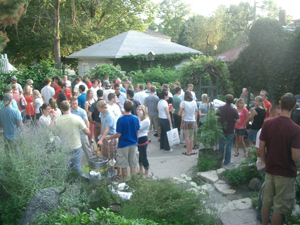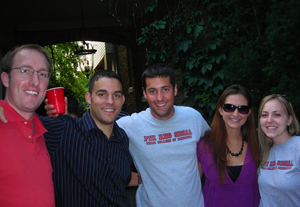 |
As classes start at UNMC each fall, the Phi Rho Sigma medical fraternity and Richard Forsman, M.D., a UNMC alumnus and volunteer faculty member, host a gathering for new and incoming medical students. Dr. Forsman said the gathering is especially helpful in allowing new medical students to feel at home in their new surroundings. |
 |
From left, third-year medical student Bill Dorwart, third-year medical student Tony Macdissi, second-year medical student Greg Nissen, second-year medical student Jill Reynolds and second-year medical student student Melanie Ortleb enjoy the gathering for students at Dr. Richard Forsman’s house. |
The start of the school year can provide some anxious moments for just about any student. That’s especially true for medical students.
Recently, I received an inside look at one of the cool things that is done to help new medical students make the transition.
I attended a rush party for the UNMC chapter of the Phi Rho Sigma medical fraternity at the home of Richard Forsman, M.D., a private practice, internal medicine physician for The Nebraska Medical Center and a clinical associate in UNMC’s Department of Family Medicine.
Dr. Forsman and the fraternity ante up for the party every year to help welcome new and returning medical students to campus.
“These kids are scared to death,” said Dr. Forsman, a 1968 College of Medicine alumnus who is originally from Aurora, Neb. “Think about it. A lot of the rural kids went to a small high school and a small college. This is their first real exposure to living in a city. Now, here they are in the big city of Omaha. It just adds to their stress.”
I was invited by a longtime colleague in the Omaha news media — radio talk show host Steve Brown — who regularly attends the party. He goes, he said, because he simply enjoys being around the medical students. They make him feel good about the future of America.
For nearly the past 20 years, Dr. Forsman and his wife, Judy, have opened up their home near Memorial Park to first-year medical students and other medical students who are members of Phi Rho Sigma. They serve barbecued pork, baked beans and potato salad. And, oh yeah, there are a couple kegs of beer.
“The first-year students are trying to prove to themselves that they deserve the slot in medical school that was given to them,” Dr. Forsman said. “They feel privileged that they have the opportunity to go to UNMC. They’re all overachievers and want to succeed. A lot of them will go home and start reading their anatomy books, even though school hasn’t even started yet.”
Several medical students who had completed at least the first year of medical school were on hand to mix with the first-year students. One of those was Ed Chartrand, a third-year medical student from Omaha who is president of UNMC’s Phi Rho Sigma chapter.
“There are lots of events going on during welcome week,” he said. “We see the barbecue as providing a relaxed setting for the students to get to know each other and gain some perspective on what they can expect during the next four years. We tell them that medical school is tough, but manageable. Help is available. We want them to enjoy life as a medical student.”
Greg Nissen, a second-year medical student from Lincoln, provided a similar perspective.
“An event like this is super important. It helps reassure these students that everything is going to be OK,” he said. “When you first begin medical school, you take a step back and say, ‘Whoa.’ You realize that everybody is super smart. It’s really intense. They don’t let you ease into the hot tub. You have to jump right it.
“All first-year students are wide-eyed. So, you come to this party, have a beer and meet a few people, and it starts to sink in — it’s not that bad.”
Shervin Razavian, a second-year medical student from Lincoln, has fond memories of the Phi Rho Sigma party he attended last year.
|
|
Noah Beadell, a third-year student from Tecumseh, Neb., remembers well the anxiety he experienced during his first year in medical school.
“Going to medical school is a daunting task. You go to your first test, and you don’t know what to expect. Everyone is thinking, ‘Am I going to fail this test?'” he said. “This is the third year I’ve attended the party. The first year you look up to everybody and ask questions. Now, it’s awesome to have others ask us the questions.”
Dr. Forsman said medical students have changed over the years.
“Back when I was in medical school, there was more social life. It was an important part of medical school. You got to know everyone in your class,” he said. “It’s a different culture today. The students tend to go different ways. Going to med school is more like a job. You do your thing, and then you go home at night.”
But, one thing hasn’t changed — the med students of today are still the best and brightest students in the state.
“You cannot come away from an event like this without having faith that we are in excellent hands,” Steve Brown said. “It’s a stark contrast from what we hear from the media about American youth today. These fabulous young people show that at least one segment of the American population is demonstrating that the American culture is not in trouble.”
After spending a night hanging out and talking with these amazing young people — I left echoing my friend Steve’s thoughts.
These kids are impressive — so smart and so polished. When it comes to medical school, they really don’t have anything to worry about.
And when it comes to the future and medicine, neither do we.